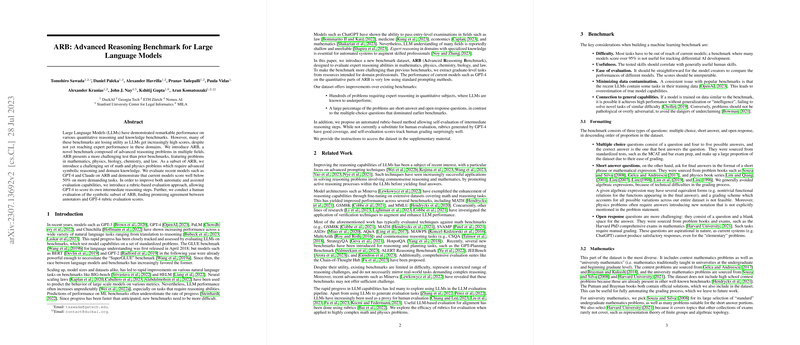Advanced Reasoning Benchmark: Evaluating Reasoning Capabilities of LLMs
The paper "ARB: Advanced Reasoning Benchmark for LLMs" introduces ARB, a novel benchmark dataset that seeks to assess the reasoning capabilities of LLMs on advanced topics that span mathematics, physics, biology, chemistry, and law. The motivation behind this benchmark stems from the observation that existing benchmarks are becoming less effective in distinguishing LLM capabilities as models continue to achieve high scores on these tests without reaching expert-level proficiency.
The ARB benchmark is noteworthy for its inclusion of graduate-level problems that require significant symbolic reasoning and domain-specific knowledge to solve. By evaluating contemporary models such as GPT-4 and Claude on ARB, the authors reveal a notable performance gap, with models achieving less than 50% accuracy on challenging tasks. This showcases the complexity and difficulty of the ARB, as existing models struggle with the advanced reasoning required by its problems.
Additionally, the paper describes an innovative rubric-based evaluation method designed to enhance automatic evaluation reliability by allowing GPT-4 to self-assess its intermediate reasoning steps. By comparing model-generated rubric evaluations with human evaluations, the authors identify promising agreement, highlighting the potential for rubric-based methods to supplement human evaluation.
Key Contributions
- Challenging Problem Set: ARB provides a collection of complex, domain-specific problems that are less susceptible to data contamination, minimizing the risk of models having been trained on identical or overly similar data. The benchmark incorporates problems from mathematics, physics, chemistry, biology, and law, offering tasks that require both symbolic reasoning and expert knowledge.
- Evaluation on Contemporary Models: Recent models were assessed on the ARB benchmark, illuminating their notable deficiencies in handling advanced reasoning tasks. This performance gap underscores the need for more robust training and evaluation methodologies to improve model competencies in specialized domains.
- Rubric-Based Evaluation Approach: The introduction of a rubric-based evaluation system allows for more nuanced assessment of problem-solving steps. This method facilitates better alignment between human expert grading and LLM auto-evaluation, pointing toward avenues for combining automated scoring practices with detailed human oversight.
Implications and Future Directions
The implications of this work are twofold: first, it stresses a pressing need for more complex and specialized benchmarks to continuously challenge and measure the evolution of LLM capabilities across sophisticated domains. Second, it explores how rubric-based evaluations can be employed to better understand model reasoning processes and identify areas for improvement. This approach could enhance the transparency and reliability of LLM evaluations, ultimately guiding the development of more comprehensive training regimes.
As LLMs are increasingly deployed in professional settings, their ability to perform complex domain-specific reasoning becomes critical. ARB is positioned to serve as a crucial tool for researchers striving to refine the intelligence and adaptability of these models. Future research could explore enhancing LLM interpretability in specialized contexts, potentially integrating more advanced multimodal capabilities to handle diverse forms of data, such as images accompanying test questions.
In conclusion, ARB represents an important step forward in the field of artificial intelligence, drawing attention to the persistent challenges that remain in bridging human-level reasoning and machine understanding. Researchers and practitioners can leverage insights from this benchmark to drive innovations in model architecture and training protocols, ultimately leading to LLMs with more profound expert-level competencies.
